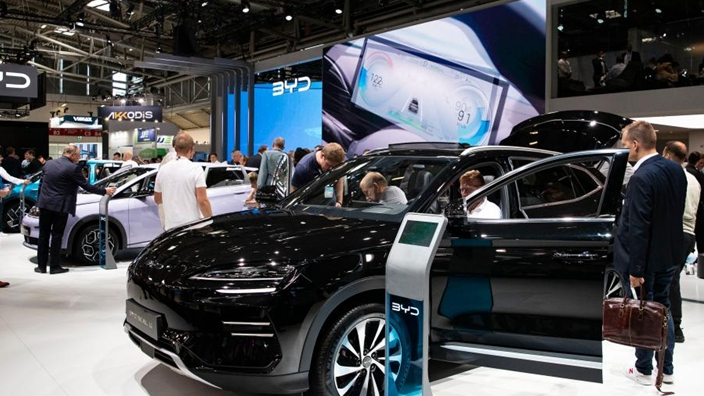
French Minister for Europe and Foreign Affairs Catherine Colonna during a press conference at the Egyptian foreign ministry headquarters in Cairo, Egypt, October 16, 2023. /CFP
French Minister for Europe and Foreign Affairs Catherine Colonna during a press conference at the Egyptian foreign ministry headquarters in Cairo, Egypt, October 16, 2023. /CFP
Editor's note: Sumaya Chowdhury, a special commentator for CGTN, is an independent columnist and freelance journalist based in Dhaka, Bangladesh. The article reflects the author's opinions and not necessarily the views of CGTN.
French Minister for Europe and Foreign Affairs Catherine Colonna is visiting China for two days on November 23 and 24, at the invitation of Chinese Foreign Minister Wang Yi, who is also a member of the Political Bureau of the Communist Party of China Central Committee.
Colonna's visit to China is part of a series of recent trips made by numerous officials from the European Union (EU) with the aim of advocating for a rebalancing of bilateral relations. Her two-day visit comes after a phone conversation on Monday between Chinese President Xi Jinping and his French counterpart Emmanuel Macron, during which the Chinese President asked France to provide a fair economic environment for the investment of Chinese enterprises in France. Colonna's discussions on cultural and scientific cooperation agreements and facilitating visas for Chinese businesspeople point to a positive impact on improving bilateral relations to address broader geopolitical challenges.
Above all else, the issue that is being widely discussed across the strategic realm, in fact, is the recently emerged trade disputes between China, the world's second-largest economy, and the EU, the largest trading bloc in the world. The issue has attracted such a great deal of attention because of Colonna's official position as the French Minister for Europe and Foreign Affairs and because France was one of the key driving forces behind the previous commencement of a European anti-subsidy investigation into Chinese electric vehicles (EVs).
The European anti-subsidy probe into Chinese electric vehicles, which began in September and was spearheaded mainly by Paris, has often been reasoned as a move by the European leaders to "seek to boost economic independence" without losing access to China's massive market. China, on its part, vehemently protested the move and accused the European Union of "blatant protectionism." Moreover, many fear that the protectionist measure risks the two economic superpowers sliding into a potential trade war with massive detrimental impacts on the global economy.
In the wake of the announcement of an anti-subsidy investigation into Chinese electric vehicles by the EU Commission, French Secretary of State for European Affairs Laurence Boon, while welcoming the move, said, "We won't let our market be flooded by over-subsidized EVs that threaten our companies." Her remarks, however, contradict the facts on the ground as Chinese cars exported to Europe are generally retailing at nearly double their prices in Chinese mainland markets.

People visit the booth of Chinese carmaker BYD during the 2023 International Motor Show, Munich, Germany, September 5, 2023. /Xinhua
People visit the booth of Chinese carmaker BYD during the 2023 International Motor Show, Munich, Germany, September 5, 2023. /Xinhua
Additionally, advocating for more economic autonomy does not mean, and should not entail, adopting the same inward-looking economic strategies that its transatlantic friend, the United States, has been doing for years. Europeans need to actively strengthen their economic sovereignty while refraining from calling for a stronger level of protectionism or a turn away from globalization. Such an aim makes sense, at a time when the United States, multilateralism's erstwhile advocate, is severely undermining it.
European policymakers have long held the view that the EU can independently choose its own economic course. However, it seems that two growing geopolitical tendencies have put this view into doubt. The first is the intensifying geostrategic competition that is narrowing the gap between geopolitical and economic objectives. While some nations are increasingly using their economic ties and strongholds – from financial connections to semiconductors – as weapons to achieve particular geopolitical or geo-economic objectives, this dangerous trend seems to jeopardize Europe's economic sovereignty.
On the other hand, by capitalizing on long-standing strategic relations, European countries are being forced to pursue many policies that are purportedly pitched upon collective benefits but are actually aimed at serving the geostrategic self-interest of a single country. As a result, this has been hastening the erosion of Europe's political sovereignty and its long-standing status as a model for a world free trade system.
As one of the key strategic players and largest economies within the bloc, France is in an ideal position to use its influence to reverse the protectionist tendency inside the union and take on the role of a balancing force in navigating the contemporary trade winds between the EU and China. It is in no one's interest to turn their annual bilateral trading relationship of $900 billion into a head-to-head battle. Through vigorously supporting open markets, cultivating strategic alliances, and encouraging cross-border innovation, France can substantially contribute to a more amicable and mutually advantageous economic environment between these two global trade giants.
(If you want to contribute and have specific expertise, please contact us at opinions@cgtn.com. Follow @thouse_opinions on Twitter to discover the latest commentaries in the CGTN Opinion Section.)



